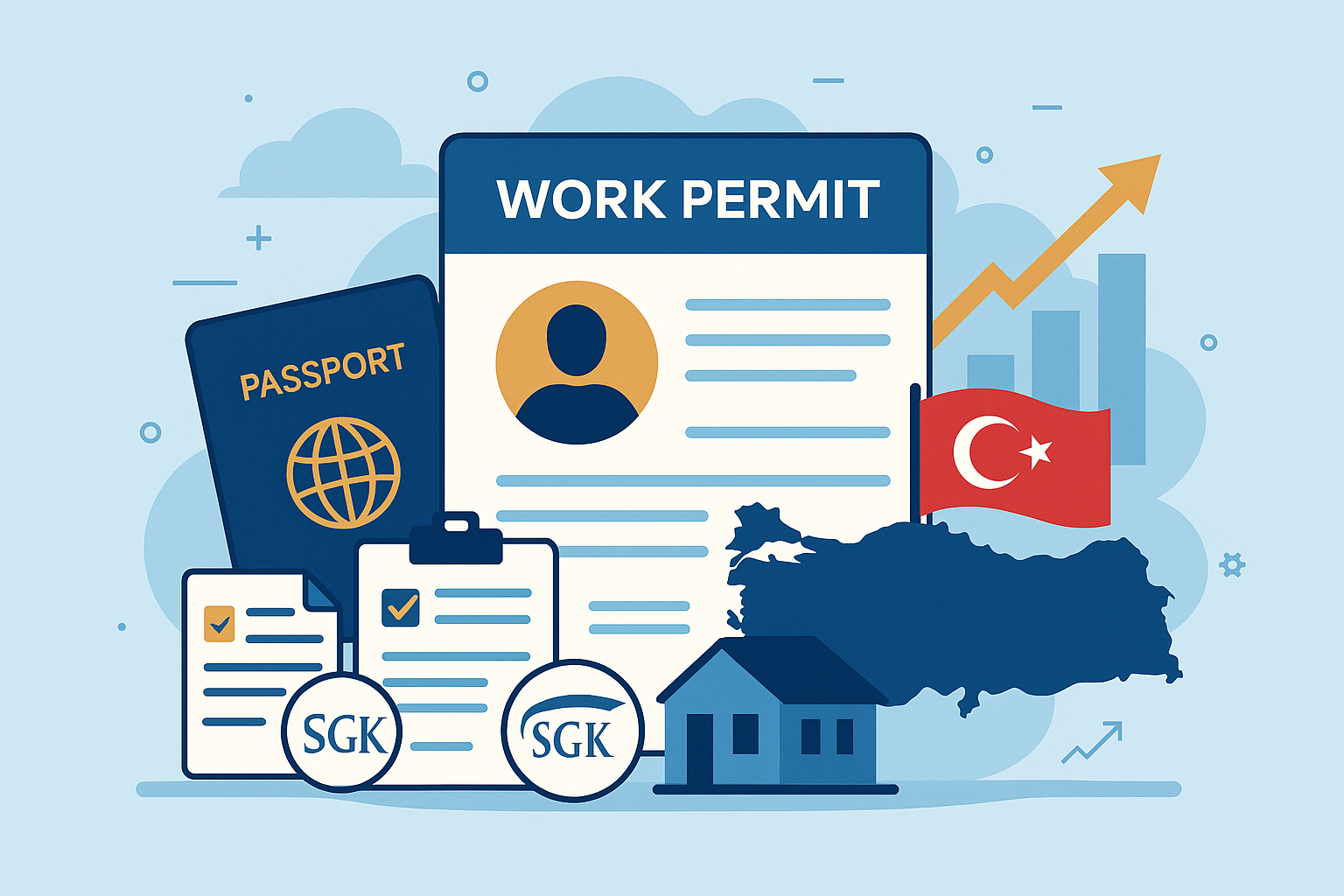1. Introduction: Türkiye as a Global Work Destination
With its thriving economy, strategic location, and growing sectors in tech, finance, tourism, and manufacturing, Türkiye has become a key destination for foreign professionals and companies seeking international talent.
However, successfully employing or working as a foreigner in Türkiye requires a solid understanding of Turkish labor law, work permit rules, and expat rights.
2. Work Permits: Who Needs One and How to Apply
a) Who Needs a Work Permit?
- All foreign nationals (except for certain bilateral agreements) must obtain a work permit to be legally employed in Türkiye.
- Exemptions: Diplomats, certain researchers, short-term artists, and journalists may have special rules.
b) Types of Work Permits
- Standard Work Permit: For private-sector employment; valid for one year, renewable.
- Independent Work Permit: For foreign entrepreneurs and freelancers with at least five years of residence.
- Turquoise Card: A special permit for highly skilled professionals, investors, or scientists—offers long-term residency and work rights.
- Temporary/Seasonal Permit: For agriculture, tourism, or project-based work.
c) How to Apply (Step-by-Step)
- Employer Initiates Application:
- Employer submits online application via the Ministry of Labor and Social Security portal.
- Required documents: labor contract, business registration, payroll records, foreigner’s diploma and passport.
- Foreign Employee Submits Documents:
- At a Turkish consulate abroad (for first-time applications) or within Türkiye (if already resident).
- Ministry Review and Approval:
- Processing time: 4–6 weeks (sometimes longer for specialized roles).
- Residence Permit:
- Work permit automatically grants residence rights for the permit duration.
d) Common Pitfalls
- Failing to meet sectoral/local employment quotas (one foreigner per five Turkish employees).
- Incomplete or incorrect documentation.
- Attempting to work before official permit approval (illegal and penalized).
3. Employment Contracts: Legal Requirements and Best Practices
a) Written Employment Contracts
- Turkish labor law requires written contracts for foreign employees.
- Contracts must specify job role, salary (in TRY), benefits, work hours, leave entitlements, and social security coverage.
- Contracts can be indefinite, fixed-term, or part-time.
b) Key Clauses and Protections
- Minimum wage: Foreigners must be paid at least the Turkish minimum wage (often higher, depending on position/sector).
- Social security registration: Mandatory for all employees, with contributions by both employer and employee.
- Notice and severance: Employees are protected by notice periods and severance pay rules.
c) Probation, Termination, and Non-Compete
- Probation periods up to 2 months allowed.
- Dismissal must comply with justified reasons and due process.
- Non-compete and confidentiality clauses are enforceable if reasonable in scope.
4. Expats’ Rights and Benefits
- Equal treatment: Foreigners are entitled to the same labor rights and protections as Turkish nationals.
- Health insurance: Compulsory via the state system (SGK) or private insurance.
- Family reunification: Work permit holders can sponsor spouse and children for residence permits.
- Pension rights: Contributions to SGK count toward Turkish and some international pensions (via bilateral agreements).
- Access to courts: Expats can file labor claims in Turkish courts and are eligible for mediation/arbitration.
5. Special Cases: Freelancers, Entrepreneurs, and Remote Workers
- Freelancers/independent professionals: Need an Independent Work Permit; criteria include long-term residence and demonstrated economic benefit.
- Entrepreneurs/startup founders: Can apply for Independent Work Permit or set up a company and sponsor themselves as managing director.
- Remote/digital nomads: Currently no special visa; working without a local contract may cause legal and tax risks.
6. Compliance, Penalties, and Employer Responsibilities
- Non-compliance: Hiring foreigners without permits results in fines, deportation, and a ban on future work permits.
- Audits and Inspections: Turkish labor authorities actively audit companies with foreign employees.
- Corporate responsibility: Employers must keep all records and meet reporting obligations.
7. Why Legal Guidance Is Essential
- Navigating bureaucracy: Legal counsel ensures timely and correct filings, reducing the risk of rejection or delays.
- Contract drafting: A well-drafted contract protects both parties and clarifies rights.
- Dispute resolution: Local expertise is key in case of termination, unpaid wages, or labor disputes.
Stj.Öğr.Esmanur AKTAŞ

Yanıt yok